|
|
|
Sort Order |
|
|
|
Items / Page
|
|
|
|
|
|
|
| Srl | Item |
| 1 |
ID:
052930
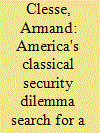

|
|
|
|
|
| Publication |
Apr-Jun 2004.
|
| Summary/Abstract |
The US is fast becoming a totalitarian, militaristic society, increasingly intolerant of different economic and political systems. Washington's policy of pursuing the elusive goal of absolute national security is in fact making both America and the world more and more unstable and dangerous
|
|
|
|
|
|
|
|
|
|
|
|
|
|
|
|
| 2 |
ID:
151647
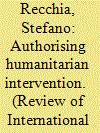

|
|
|
|
|
| Summary/Abstract |
Even scholars who support multilateralism in principle frequently question the value of securing approval from existing multilateral bodies for humanitarian intervention. The United Nations (UN) and regional organisations such as NATO, the argument goes, are far from democratic; furthermore, multilateralism is often a recipe for doing nothing; therefore, unauthorised intervention should be permissible in circumstances of ‘humanitarian necessity’. This article maintains that although today’s multilateral organisations and related procedures for authorising armed intervention may be suboptimal, they have significant output legitimacy. First, existing authorisation procedures reduce the risk of destabilising conflict spirals among powerful states. Second, they diminish the likelihood that humanitarianism will be used as a pretext. Third, they reduce epistemic problems concerning the identification of a just cause for intervention and thus the risk of accidental abuse. Fourth, they minimise the ‘moral hazard’ of humanitarian intervention. Finally, compliance with multilateral procedures is increasingly required for successful peacebuilding. This leads me to conclude that humanitarian warfare should always be authorised by the UN or regional multilateral organisations.
|
|
|
|
|
|
|
|
|
|
|
|
|
|
|
|
| 3 |
ID:
075296
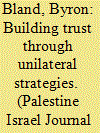

|
|
|
| 4 |
ID:
052945


|
|
|
|
|
| Publication |
Apr-Jun 2004.
|
| Summary/Abstract |
While pursuing number one status the United States has become an authoritarian, conservative and culturally backward society. Afflicted with a declining economy, the country is clearly headed in the wrong direction
|
|
|
|
|
|
|
|
|
|
|
|
|
|
|
|
| 5 |
ID:
071595


|
|
|
|
|
| Publication |
2006.
|
| Summary/Abstract |
In this article, it is argued that the genesis of the Iraq Crisis of 2003 within the Security Council can be traced to earlier patterns of acquiescence by Council members in US and UK unilateral enforcement action in Iraq. By the time this acquiescence ceased, between 1994 and 1996, UK and US enforcement policy was set and would culminate in Operation Iraqi Freedom in March 2003.
|
|
|
|
|
|
|
|
|
|
|
|
|
|
|
|
| 6 |
ID:
074745
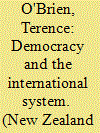

|
|
|
| 7 |
ID:
165904
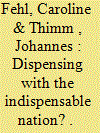

|
|
|
|
|
| Summary/Abstract |
Since entering office, US president Trump has reversed key multilateral achievements of his predecessors, initiating a new US retreat from multilateral cooperation. For other governments wishing to preserve and deepen existing global agreements, this has posed the question of whether and how multilateral cooperation can work without the leadership and support of the dominant global power. International relations scholars have already debated the possibility of “nonhegemonic cooperation” in earlier periods marked by US unilateralism. This article draws on these previous analyses to evaluate the current prospects and limits of a “multilateralism minus one” in three key global policy areas: nuclear arms control, climate change, and trade.
|
|
|
|
|
|
|
|
|
|
|
|
|
|
|
|
| 8 |
ID:
068848
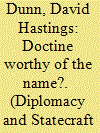

|
|
|
| 9 |
ID:
052743
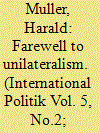

|
|
|
| 10 |
ID:
071108
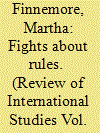

|
|
|
| 11 |
ID:
058052
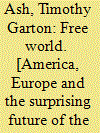

|
|
|
|
|
| Publication |
New York, Random House, 2004.
|
| Description |
xiv, 286p.Hbk
|
| Standard Number |
1400062195
|
|
|
|
|
|
|
|
|
|
|
|
Copies: C:1/I:0,R:0,Q:0
Circulation
| Accession# | Call# | Current Location | Status | Policy | Location |
| 048953 | 909.09821083/ASH 048953 | Main | On Shelf | General | |
|
|
|
|
| 12 |
ID:
061908
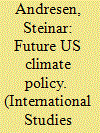

|
|
|
| 13 |
ID:
096580
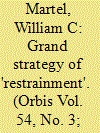

|
|
|
|
|
| Publication |
2010.
|
| Summary/Abstract |
With the end of the Cold War, the subsequent global war on terror, the global economic recession, and wars in Afghanistan and Iraq, one would think that the United States would have formulated a grand strategy for dealing with these problems. This, however, is not the case. This article advances a grand strategy of "restrainment," as a guiding concept for our approach to international politics. It builds from the principle that U.S. policy must seek to restrain-individually and collectively-those forces, ideas, and movements in international politics that create instability, crises, and war.
|
|
|
|
|
|
|
|
|
|
|
|
|
|
|
|
| 14 |
ID:
085523
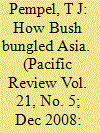

|
|
|
|
|
| Summary/Abstract |
Criticism of the Bush administration's policies in East Asia is hardly common fare. Roseate colors certainly pervade the picture painted by defenders of Bush's policies toward Asia who argue that relations between the US and that region have never been better. This paper shows to the contrary that the Bush administration politicized wide swaths of public policy, including foreign relations, in an effort to create a permanent Republican electoral majority. That effort created a host of failures in America's Asian relations. The article focuses on three central problems: excessive militarization of American foreign policy; economic mismanagement; and a unilateralism that distanced the US from the rising Asian regionalism. The failures are not irreversible however and a change in administration has the potential to revitalize cross Pacific ties.
|
|
|
|
|
|
|
|
|
|
|
|
|
|
|
|
| 15 |
ID:
085953
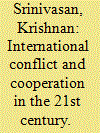

|
|
|
|
|
| Publication |
2009.
|
| Summary/Abstract |
The rise of modern institutional multilateralism is a phenomenon dating back less than a hundred years, and there is no reason to infer that it is either immutable or permanent. With the end of the Cold War, there was an expectation of global consensus and the implementation of collective security. But this depended to an excessive extent on the United States and its willingness to use force, and the level of subjectivity in US-led interventions gave rise to questions of whether multilateralism could survive in conditions of unipolarity. Now the primacy of the United States is slipping, and its pre-eminence will decline as manufacturing, technology and innovation spread. From being the major lending country, it has become the biggest debtor. Despite American military superiority, the world will be increasingly poly-centric and the new emerging powers will exert a strong and increasing influence in world affairs. The character of international cooperation in the next few decades will be shaped by a process by which about half a dozen new major powers seek to mould regional orders of their own. A return to something akin to the 19th-century Concert of Powers seems possible, but this time on a global scale, and with the participation of the emerging strong nations in formal and informal governance structures. The United Nations will continue as a symbol of state sovereignty, and its remit in humanitarian, cultural and developmental good works will be unchallenged, but peace and security decisions at the regional level will be taken by the regional powers on the basis of their self-interest and without reference to the United Nations. Notwithstanding the reasons for the future world order, the existing foundations of security management will not be replaced by anything more reliable, just or legitimate.
|
|
|
|
|
|
|
|
|
|
|
|
|
|
|
|
| 16 |
ID:
052321
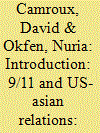

|
|
|
|
|
| Summary/Abstract |
The rhetoric of US foreign policy since the attack on the World Trade Centre in New York on 11 September 2001, would suggest that there has been a fundamental shift in US foreign relations. This is often summarised as a shift from multilateralism to unilateralism and, in the context of the war on terrorism, concomitantly a shift from geo-economic to geopolitical priorities. The rhetoric of the fight against the 'axis of evil', however, may simply cloud underlying continuities in US relations with Asia. Nevertheless the process of coalition-building by the Bush administration in the 'War on Terrorism' has impacted on the distance Asian countries have been able to maintain in relation to the United States. The case studies presented in this special issue raise a number of important issues concerning perceptions and the practice of US hegemony and the complex links between leadership and 'followership' at the inter-state level. They also draw out the impacts engendered by US-Asia relations on the wider phenomenon of regionalisation in the Asia-Pacific region.
|
|
|
|
|
|
|
|
|
|
|
|
|
|
|
|
| 17 |
ID:
086399
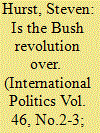

|
|
|
|
|
| Publication |
2009.
|
| Summary/Abstract |
Several observers have argued that the radical transformation of American foreign policy wrought by George W. Bush is already over. They argue that the 'Bush Revolution' was merely a result of the short-term conjuncture of neoconservative influence and the impact of September 11, 2001, and that this temporary deviation has been ended by the American failure in Iraq. Yet the causes of the Bush Revolution are more fundamental and long-term than this argument implies. It is in the combination of the shift to a militarily unipolar international system and the dominance of the Republican Party by its conservative wing that the real roots of the Bush foreign policy lie, and neither condition is likely to alter in the foreseeable future. Moreover, although the Iraq War has led to some shifts in policy, the Republicans' selection of John McCain as their presidential candidate confirms the continued vitality of the Bush Revolution.
|
|
|
|
|
|
|
|
|
|
|
|
|
|
|
|
| 18 |
ID:
075010
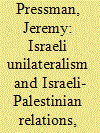

|
|
|
|
|
| Publication |
2006.
|
| Summary/Abstract |
Israeli-Palestinian relations witnessed dramatic changes from 2001-2006. Sharon came to power, the second intifada (uprising) raged, Arafat died, Israel withdrew from Gaza, and Sharon fell ill and out of political life. Israel's embrace of unilateralism led to the Gaza disengagement and the construction of a barrier in the West Bank. Why did Israel embrace unilateralism? Israel's unilateral approach to the Palestinian question resulted from the failure of three other approaches to addressing the conflict: bilateral diplomacy, Greater Israel and settlements, and military suppression. Unilateralism was not inevitable, but Israelis and Palestinians missed opportunities to pursue other pathways. The United States also missed chances to jump-start bilateral diplomacy. The United States role in these years was less consistent and less pro-active than under the first President Bush and President Clinton.
|
|
|
|
|
|
|
|
|
|
|
|
|
|
|
|
| 19 |
ID:
121509
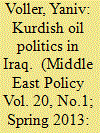

|
|
|
| 20 |
ID:
171708


|
|
|
|
|
| Summary/Abstract |
Scholars argue that the 1991 Gulf War, when the United States worked hard to secure approval from the United Nations (UN), set a precedent for legitimate military intervention that other states, especially other liberal democracies, subsequently felt compelled to follow. France, however, continued to intervene unilaterally in its traditional African sphere of influence for several years, without seeking approval from the UN or regional bodies. Even after France drew widespread opprobrium for its support of a murderous regime in Rwanda, French leaders deployed thousands of combat troops unilaterally on various missions. This article relies on original interviews with French policymakers as well as on primary documents to make the case that the 2002–04 Côte d’Ivoire intervention finally steered French Africa policy towards greater multilateralism. It drove home the danger that unilateral interventions could fuel anti-French sentiment among African audiences, undermining France’s regional influence. Ultimately, therefore, concerns about African acceptance more than broader international pressure led France to fully embrace new norms of legitimate intervention.
|
|
|
|
|
|
|
|
|
|
|
|
|
|
|
|
|
|
|
|
|